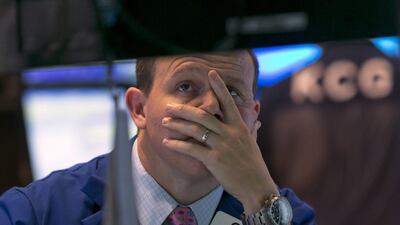Volatility in global markets will affect Abu Dhabi and Dubai indexes in the short term, but the strength of the overall economy will keep the UAE markets in good stead, analysts said.
On Friday, major European markets took a dive after the European Central Bank president Mario Draghi said that there were signs that euro-zone growth was slowing.
The FTSE 100, Germany’s Dax, France’s Cac, Italy’s FTSE MIB and Spain’s Ibex all slid by between 0.9 per cent and 2.4 per cent over Thursday’s close.
On Wall Street, the Dow Jones Industrial Average, Nasdaq and Standard & Poor’s 500 fell sharply by between 0.6 per and 2.3 per cent, with the Nasdaq capping its worst week in 30 months.
There will be sell-offs and recoveries in the local markets in the near term as western markets react to the uncertainty of an interest-rate increase in the United States and the slowdown in Europe, said Saleem Khokhar, the head of equities at National Bank of Abu Dhabi.
But the region’s limited reliance on foreign capital – a cushion for the oil-exporting countries in the Arabian Gulf – ensures that the global volatility would have limited local impact, he said.
“I would expect volatility as you won’t be able to dissociate yourself from what is happening with the global environment,” said Mr Khokhar.
“So you will feel that in the short term, but longer term, the underlying health is strong and you should be seeing an upside movement.”
As an emerging market, the UAE won’t be able to isolate itself, and the correlation becomes high when there is international chaos, said Tariq Qaqish, the deputy head of asset management at Al Mal Capital.
“But at the same time we have positive news coming in from Emaar,” he said. “In the long term, the UAE and Gulf countries have huge fuel and financial resources and they will be less affected, but we will be highly correlated to the international market [and] we will see more volatility in the international market.”
Some analysts expect Gulf markets to fall or remain flat in the next few weeks.
“With brent falling below US$90 per barrel, the question is whether we could be braced for some spending cuts unless governments resort to borrowing,” said Allen Sandeep, the director of research at Naeem Brokerage in Cairo.
Mr Khokhar said the Russia-Ukraine crisis had hurt European growth and that weakness in Europe was expected to be persistent.
Nonetheless, he said the full global outlook was positive.
“There will be areas which will begin to struggle across the globe but we are not going toward an overall global bear market,” he said.
Rising interest rates in the US were an indication of optimism, he added. “Overall you have to remember why rates are rising because we are at a better global environment that can take rate increases.”
Stability would follow the increases, he said.
On Thursday, well before most sell-offs in the West, the Abu Dhabi index inched down 0.1 per cent to 5,077.4 points.
The Dubai Financial Market advanced to 4,942.9 points, up by 0.9 per cent.
ssahoo@thenational.ae
Follow The National's Business section on Twitter

